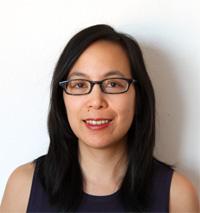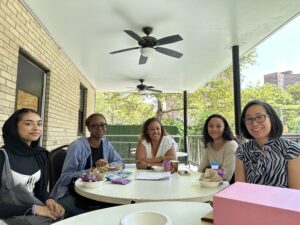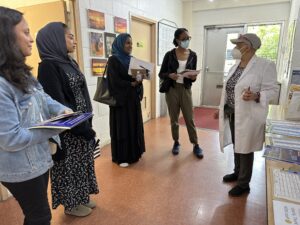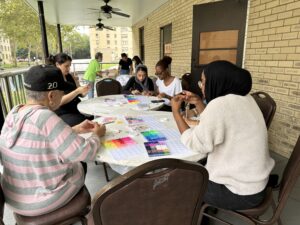Organizations play a significant role in shaping our interactions, beliefs, and perspectives toward the world we live in. City College’s Dr. Katherine Chen, who’s been on staff for 15 years, is at the forefront of a movement building knowledge on not only how organizations work but also what they can do better.

Dr. Katherine Chen. Photo: CCNY
Her most recent work has been as a co-investigator on a project about sustainability and community resiliency supported by College-wide Research Vision and Opportunities in Research and Creative Arts. During the summer of 2023, she co-led a team of undergraduate students to work with the Naturally Occurring Retirement Community, or NORC, funded by the NYC Dept. for the Aging at a Mitchell-Lama housing complex called Masaryk Towers in the Lower East Side this summer — one of the first teams of undergraduate students at the site since the COVID-19 pandemic began in 2020. Her team helps the complex’s older residents age in place by engaging them and learning how they build formal connections with organizations that connect them to resources like food banks and emergency housing, as well as help them put into place futures for present and future generations through environmental sustainability efforts.

Courtesy of Katherine Chen
At City, Chen teaches students how to collect and analyze data from experiments and surveys and how to operate in the field, skills ultimately extending from her own experience as an organizational ethnographer.
“Most of us spend a lot of time in organizations — in the U.S., it’s pretty difficult to get things done without having some involvement in organizations,” Chen said in an interview. “But they’re so common that people oftentimes don’t think about them. …[I]n my discipline [of sociology], the tendency is to look at individual persons or maybe neighborhoods, but not… look at where the majority of people will spend their time, which is some kind of organization, …like a school or workplace or voluntary association, or it could be a more informal group that doesn’t have a formal organization status but is very important to the society functioning.”
Chen specializes in observing people and their activities in organizations. Her first organizational ethnography included “Enabling Creative Chaos: The Organization Behind the Burning Man Event.” In this award-winning book, she examined how an organization recruited and supported volunteers in their efforts to build an annual, temporary community in the Nevada Black Rock Desert. Her latest book, “Organizational Imaginaries: Tempering Capitalism and Tending to Communities through Cooperatives and Collectivist Democracy,” co-edited with Victor Tan Chen, called on social scientists to consider alternative systems of organizations given critiques of current organizational systems. The volume, consisting of research articles written by expert researchers on worker cooperatives and other alternative organizations from around the world, won the 2022 Joyce Rothschild Book Prize.
A multitude of factors have highlighted a growing need among all kinds of demographics for connection and support via these and other kinds of organizations. Pandemic-induced lockdowns, remote work, and remote learning have, in many ways, unsocialized a sizeable portion of the population in recent years, and concerns about automation and technology displacing jobs, alongside the instabilities of state failure, climate change, and wars have clouded people’s future hopes.

Courtesy of Katherine Chen
“Some people feel like trying to re-engage the world might be very tough and, in fact, it might be a little frightening,” Chen said.
Social distancing also came at a moment when much of society began to change how they spent their free time. Factors like rising costs of living and the availability of social media have changed the relationships people have with each other and with organizations.
“It used to be when people had free time, you would spend it getting to know your neighbors or in some kind of social club…now, people do turn to organizations, but they use them in a different capacity,” Chen said. “So, for example, … in your free time, you’re probably looking at social media, like Instagram or others… [where] you have a different kind of relationship to organizations.”
In recent years, inflation surged to a high of 8.2% in 2022, following a pandemic-induced low of 1.23% in 2020, sharply raising living expenses and compelling many to allocate more time to work amid stagnant wage increases. With a rise in wages still lagging, Chen said many people have lost much of their free time to work.
Social interaction plays a quintessential role in well-being, societal cohesion, learning, and cultural understanding. At a personal level, it provides emotional support, cultivates a sense of identity and belonging, and hones cognitive function, all crucial for mental health.
Often, by engaging with a diverse cohort of people in organizations like universities, individuals garner a richer understanding and appreciation of different cultures and perspectives, promoting cultures of diversity and inclusion. Through these dimensions, social interaction is often more than just a conduit for personal satisfaction but a linchpin for cohering society at large.
But how are these interactions initiated — and what are organizations’ role in coordinating them? Chen’s work probes organizations, like the NORC at the Masaryk Towers, for an answer to the question.
In many cases, facilitating effective interactions can be simpler than expected. Undergraduate students in Chen’s group at CCNY, through the ORCA program, centered engagement around a shared activity at the Masaryk Towers.
Chen mentioned that as a community activity, the undergraduates engaged residents in jewelry making and tie-dye shirt crafting at the close of the previous semester.
This workshop was used to broach weighty topics that would otherwise be less accessible to discuss had a planned event been centered around the topic, such as climate change.
“Something where you actually make things and you are sitting down together and doing an activity together; it’s a way of building up community,” she said. “And during that time, you can actually start to have these kinds of conversations in a less formal way, which might be more appealing to people. There’s not the same kind of pressure… if you have, say, meetings totally dedicated to climate change.”

Courtesy of Katherine Chen
Students in Chen’s working group have had to adjust their ability to interact as well; the work at the Masaryk Towers has seen them take a much more participatory approach from simply observing people’s behavior to initiating conversations and activities with residents.
“…because I was a professor, I was … more in the background and more observing our undergraduates as they got … more hands-on experience of what it’s like to talk to community members about their interests or their experiences,” Chen said. Through such work, Chen has great hopes that such undergraduates will gain the experience and confidence to assume leadership responsibilities of organizing community engagement in their local communities — an important step in making sure that such research can be connected with groups that otherwise might not be heard or recognized.
Judah is a senior at CUNY Baruch College, pursuing a major in journalism and minors in computer science and environmental sustainability. He is also the business editor for Baruch’s independent student newspaper, The Ticker, and co-managing editor for the Baruch Journalism Department’s magazine Dollars & Sense.